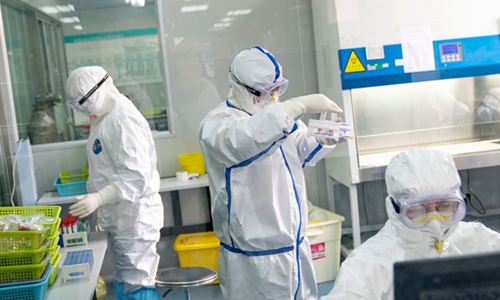China vows to enhance bio-lab safety
Source:Globaltimes.cn Published: 2020/5/12 6:58:52

Staff members work in a laboratory in Wuhan, central China's Hubei Province, Feb. 13, 2020. Photo: Xinhua
China's National Health Commission (NHC) Monday called for enhanced management at its bio-security laboratories as the country normalizes during its anti-epidemic stage.
The move also comes amid controversy over its alleged relaxed management at a bio-safety Level 4 lab (BSL-4), known as a P4 lab, in Wuhan, which Western politicians have alleged could be the origin of the novel coronavirus (COVID-19). The groundless accusations have been slammed and refuted by Chinese authorities and experts.
Cultivation and animal infection tests for the novel coronavirus, whose official name is SARS-Cov-2, can only be conducted in P3 or P4 labs. Operation on uncultivated infectious materials is permitted at P2 labs, but researchers must be protected, in accordance with P3 lab requirements, according to an NHC draft released on its website.
The new draft requires inactivated coronavirus materials to be preceded at P2 labs. Operations that do not engage with an active virus, such as a molecular clone, can be conducted at P1 labs.
The draft also clarifies requirements on transformation, restoration, disposal, and isolation procedures of the novel coronavirus.
Labs must report to the NHC before they provide the novel coronavirus or transport vaccine strains between labs and institutes.
Labs must also report to the NHC virus information when it's isolated for the first time. They also must apply with a national-level virus restoration institute within 90 days following isolation, and then send the virus to be restored after the research is complete, according to the draft.
The draft calls for enhanced management of virus information and for samples to protect patient privacy. Bio-lab supervision by local authorities should also be strengthened.
Nucleic acid tests for COVID-19 should be conducted at P2 labs, but apply personal protective measures required for P3 labs.
Beijing authority announced on Monday that it is considering setting up a large laboratory to improve the nucleic acid testing capacity of the Xiaotangshan Hospital in the capital city. The lab is also expected to exert greater effect in the future, according to a Beijing News report.
Built-in 2003 to quarantine and treat SARS patients, Beijing's Xiaotangshan Hospital was renovated and went into operation on March 16 to screen and treat imported mild and common COVID-19 infections, along with suspected cases and those who need to be tested.
Posted in: SOCIETY